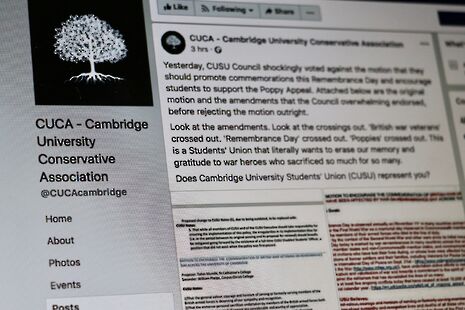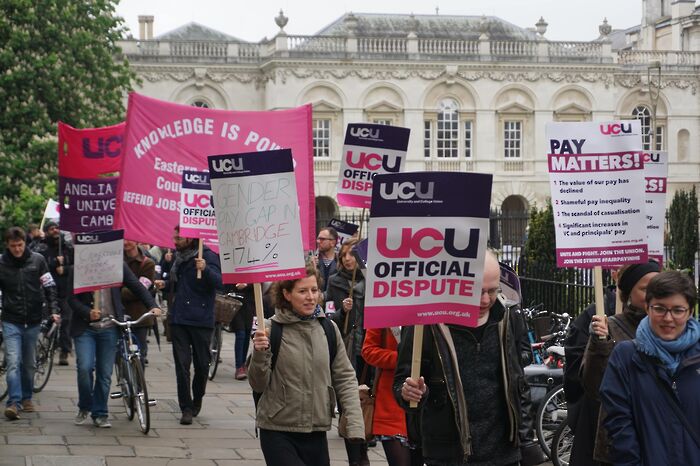CUSU Council embroiled in Remembrance Day debate
Students differed over views on a motion to commemorate Remembrance Day

A clash over Remembrance Day occurred at yesterday night’s CUSU Council, the first of the academic year, as attendees overwhelmingly rejected a motion calling for the commemoration of “all those whose lives have been affected by war across the University of Cambridge”
The original motion, encouraging the commemoration of British war veterans, was proposed and seconded by Cambridge University Conservative Association Committee members Tohin Munshi and William Phelps, respectively. An extended amendment rewriting the motion, to frame it around victims of war globally, was put forward.
The amendment had initially been accepted with 30 votes in favour, and one against, but was eventually rejected when it came to the final vote on the motion – with only three votes in favour, and 11 abstentions, after concerns were raised by several JCR representatives that the amended motion was overly vague.
CUCA responded to the events on their Facebook page this evening, writing, “CUSU Council shockingly voted against the motion that they should promote commemorations this Remembrance Day and encourage students to support the Poppy Appeal.”
They pointed to the amendment, which had struck through large sections of text, saying: “‘British war veterans' crossed out. 'Remembrance Day' crossed out. 'Poppies' crossed out. This is a Students' Union that literally wants to erase our memory and gratitude to war heroes who sacrificed so much for so many.”
The student who proposed the amendment countered suggestions of erasure on the part of CUSU, and told Varsity that as she wrote the amendment and does not hold a position within CUSU, “CUCA's lazy claim that their loss was somehow orchestrated by CUSU is, of course, inaccurate”, and “in reality, an accountable body of student representatives simply disagreed with them.”
CUSU President Evie Aspinall also criticised CUCA’s “conflation between ‘CUSU’ and ‘CUSU Council’ which implies that this decision was made by only a few officers”, adding that “CUSU sabbs did not propose or amend the motion or direct Council on how to vote”.
During Council, the student criticised Munshi and Phelps’ focus on British veterans, and said to Council that “CUSU should reflect the status of the University as an international institution”, which she said “self-describe[s] as a global community”. She told Varsity that “for many people, war is not something that can be consigned to the past, and the original motion's focus on remembrance as 'valorising' war instead of working to end its devastating impact is deeply disturbing.”
CUCA told Varsity that the amendment “had the clear intention of de-emphasising the sacrifices made by our brave armed forces”, and that “we thought we could help raise some money for struggling veteran charities, and the response from CUSU Council was as depressing as it was deplorable.”
The student who proposed the amendment argued that it was “vital that we recognise all different background and don’t just focus on British war veterans”, or “just the First and Second World Wars”. She added that there are “many tragedies around the world and instances of terrible violence that we should commemorate and reflect on”, and that it is “important that we think about Cambridge’s place in this, and we do focus on remembering the past, but in a way that is constructive and critical”.
The amendment added that the University should raise awareness of the issue, “not only as a mark of respect and commemoration to the lives lost and affected by war, but also as a part of the active promotion of a global view of institutional memory and Cambridge’s place within this context”.
Speaking to Council, Munshi praised the armed forces, and added that he “[sees] very few, if any students wearing poppies” in the lead-up to Remembrance Day.
Munshi elaborated that “veterans are more likely to be rough sleepers, more likely to be unemployed, and more likely to have PTSD”, and that Cambridge students, “as pioneers of justice … should take up their cause as our own.”
One student asked Munshi “why are you promoting more recognition of Remembrance Day, rather than more support for veterans?”. Munshi responded that “in the Remembrance Day period, poppies are sold”, which is how the Royal British Legion, a charity for British veterans and their families “raises most of its money”.
Phelps, who seconded the motion, argued that “Remembrance Day should be fundamentally apolitical”, but thought “the idea of an international globalist University” seemed “motivated by political concerns”. He added that as Cambridge is “in Britain, funded by the British government … we are of course a British University”.
President of Murray Edwards MCR Tamzin Byrne addressed Council during the discussion, and stressed that she was strongly opposed to the initial motion and the amendment, arguing that both were “from a British perspective” despite the amendment. She elaborated that “much of both motions assume the past tense, whereas… victims continue to be affected by the outcomes of those wars”, and that “there’s no genuine way in which a single campaign from CUSU can properly reflect the things that have happened to those involved in war”.
Byrne pointed students to “many well-run and permanent campaigns within the community more broadly” that serve to address the victims of war.
Connor MacDonald, former President of Emmanuel College Students’ Union waded into the debate, arguing that the motion was not apolitical: “I would tend to agree with those who say that even to commemorate British war veterans is a political act”. However, he then said that “in this country, at this time, 100 years after 11 November 1918, [the idea that] this Council cannot accept and won’t make a statement about… all those who fought and died for us” was “rather damning”.
Demilitarise Cambridge, a new campaign which seeks to end the University’s links with arms companies, said that the proposed motion “intentionally glorified and valorised conflict.” They added that CUCA's "insistence on supporting “British” troops to the exclusion of millions of other victims of war is jingoistic, imperialist propaganda, saying that they hope CUCA “come to terms with the fact that they lost a democratic vote and that an overwhelming majority of students reject their chauvinism.”
- This article was updated on October 12th to remove the name of a student who has been the target of online abuse and trolling since her amendment made national headlines. Varsity has chosen to remove her name in light of what we see as concerning personal targeting of her.
 News / Cambridge academics sign open letter criticising research funding changes22 February 2026
News / Cambridge academics sign open letter criticising research funding changes22 February 2026 News / Student and union protesters hold ‘Trans Liberation Solidarity Rally’ 24 February 2026
News / Student and union protesters hold ‘Trans Liberation Solidarity Rally’ 24 February 2026 News / Union speakers condemn ‘hateful’ Katie Hopkins speech14 February 2026
News / Union speakers condemn ‘hateful’ Katie Hopkins speech14 February 2026 Features / Beyond the porters’ lodge: is life better outside college?24 February 2026
Features / Beyond the porters’ lodge: is life better outside college?24 February 2026 Theatre / Footlights Spring Revue? Don’t Mind if I Do!25 February 2026
Theatre / Footlights Spring Revue? Don’t Mind if I Do!25 February 2026










